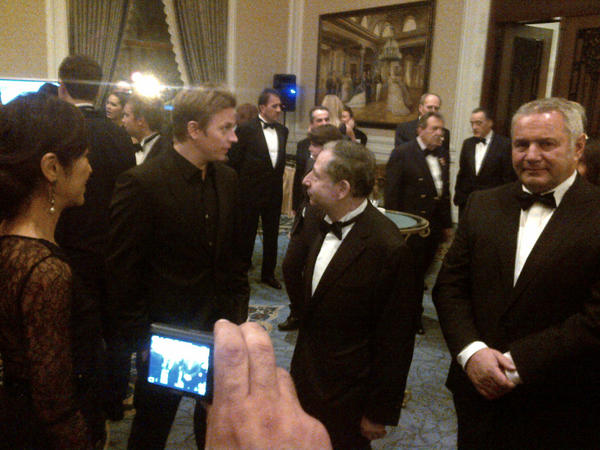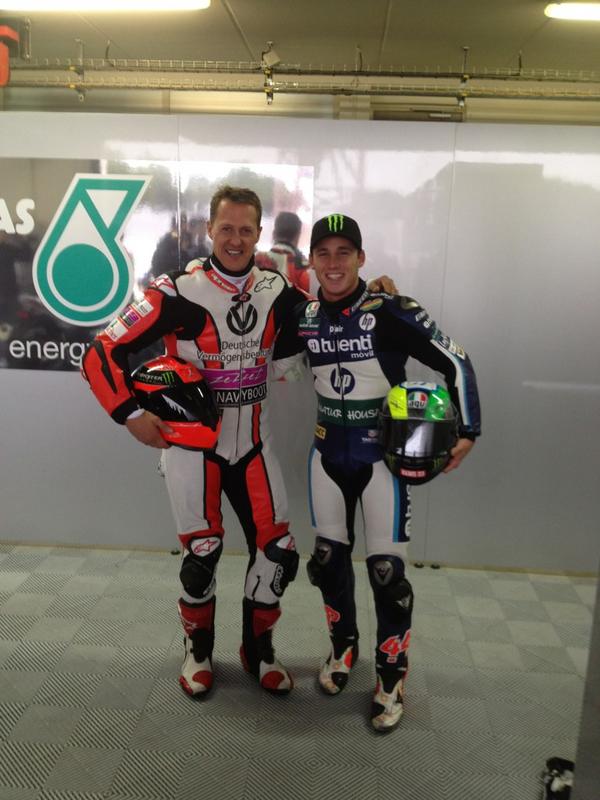Michael Schumacher - The strange story of his retirement
Contributed by Business F1
Thursday, 05 April 2007
The dramatic circumstances of the Italian Grand Prix and Michael Schumacher’s retirement will live on for a long time. After his rival was sidelined by a bizarre stewards’ decision, Schumacher won the race and then announced his retirement. But it was an amazing few hours, worthy of a scripted piece of drama. BusinessF1 retraced the moves that led to that startling finish.
By Tom Rubython On Sunday 10th September 2006 at 3:25pm, precisely the same time as Michael Schumacher passed the checkered flag to win the Italian Grand Prix, the staff of Ferrari’s press supremo, Luca Colajanni, started handing an A4 sheet of paper to journalists outside the team’s motorhome. It was a one-page press release announcing the retirement of the most successful racing driver in history, a driver at the top of his game challenging for the world championship. Colajanni had been given precise orders by Ferrari chairman Luca di Montezemolo about just what he had to do and when he had to do it.
It was strange timing, as Schumacher was about to make the announcement himself in the winner’s press conference after the podium ceremony. Normally press releases are handed out after an announcement has been made, or during it – but rarely before. It takes away the point. As so it turned out when half an hour later Schumacher found himself announcing what everybody already knew.
The Ferrari team’s haste to announce its driver’s retirement was indeed bizarre. Colajanni had wanted to pre-empt the driver’s own announcement as if to make sure there was no turning back.
Montezemolo had exercised a strong presence in the Ferrari garage at Monza Park all weekend. On qualifying day he hovered around the Ferrari motorhome waving away journalists’ enquiries about what was going on. On race-day he had arrived with John Elkann, the most senior member of the Agnelli family working at Fiat, and Sergio Marchionne, the chief executive of Fiat. He also had Piero Ferrari in his party. One observer was mystified at the presence of all these big guns and said: “It was as though Luca wanted reinforcements.” But reinforcements for what? It was soon to become clear. Although everything looked normal in the Ferrari garage and motorhome, underneath the surface a civil war was concluding, in Montezemolo’s favour. It had run all summer, but was finally coming to an end. All that Montezemolo now required was for Jean Todt, the team principal, and Michael Schumacher, the number one driver, to run up the white flag.
In truth no one knew what was about to happen. Schumacher didn’t want to retire, at least not that day. And he thought he still retained enough power to get his way. But Montezemolo had long before given him a deadline of Monza and told him (expressly against Jean Todt’s wishes) that it was either driving alongside Kimi Räikkönen in 2007 – or retirement.
In a previous age no one had dared tell Michael Schumacher what to do. He had been king of Formula One for 12 years and for half of them was easily the sport’s most powerful man, eclipsing even Bernie Ecclestone.
Montezemolo hated this situation and had also come to resent Jean Todt’s role in the Michael Schumacher show. He took the Enzo Ferrari view that drivers were employees who performed at the behest of their employers. Todt on the other hand took a collegiate view; the top people at the team, including Schumacher, were his close friends and far from being his employees.
But there is no doubt that this combination of opposing management styles got the job done. And for that reason each had tolerated the other.
Only once before in the 11 seasons that Schumacher had been a Ferrari driver, in 1999, had Montezemolo insisted on getting his way.
Officially, of course, none of the above occurred. The official line was that Schumacher had simply decided to retire many months before and that Ferrari had signed Räikkönen to take his place, end of story. In fact, Todt suggested anyone who thought any different was “stupid”.
Everyone, then, is stupid.
There was clearly tension between Todt and Montezemolo that weekend in Monza. On Friday and Saturday, there had been an uneasy peace as both men went about their business. Then, on race-day, with less than 15 minutes to the start, Montezemolo broke away from Ferrari on the grid and went up to Räikkönen’s car. He leaned over the cockpit and gave a thumbs-up sign, as if indicating that all was going to plan. It was a strange action to pursue with his team’s close competitor at Ferrari’s home race.
After Schumacher’s race victory, Montezemolo was delirious with joy and, flanked by Elkann and Marchionne, in the full glare of television, he embraced Jean Todt and kissed him. But as Montezemolo kissed him Italian style and threw his arms around his shoulders, Todt quickly turned away. It resembled the scene in ‘The Godfather Part III’ when Michael Corleone embraces his brother Fredo whilst whispering his death sentence.
Then it was Michael Schumacher’s turn. After being pecked by Montezemolo, he too resisted his boss’s celebratory embraces and looked blankly over his shoulder. For Montezemolo, as he embraced the two men he knew the press release signalling his victory was being handed out to journalists.
It was now clear to insiders that Montezemolo had won his internal battle with Todt to turn Räikkönen’s option into a firm contract drive for Ferrari in 2007. And it was clear that Schumacher’s ultimatum of ‘Räikkönen’s or me’ had been ignored.
It was a battle Montezemolo had been determined to win. Six years earlier, to give the team the very best chance of winning, he had wanted to hire Mika Häkkinen as team-mate to Schumacher. But he had been blocked by the twin powers of Schumacher and Todt. This time he was determined to prevail. He wanted Räikkönen, and if that meant Schumacher’s departure, then so be it. And he also made it clear he was not prepared to carry on paying Schumacher his US$45 million a year in his twilight years. In any case that money was no longer available, it had been allocated to Räikkönen in a deal skilfully negotiated by the driver’s manager David Robertson.
In truth Schumacher was not simply being pushed out of Ferrari, he was not prepared to carry on under the terms that were being offered. So he reluctantly decided to retire. And in any event it was good timing – he was going out at the peak of his powers.
Naturally, in the circumstances, the two press conferences, first for TV and then for the press were sad affairs. Schumacher was very morose. He clearly saw no happiness in retirement. But he played the company line and did not vent any feelings of being pushed out. That was not Schumacher’s way. And the timing of the press release before his own announcement had given him no room for manoeuvre. It was done on the express orders of Montezemolo to ensure that he, and not Schumacher, was setting the agenda.
The sense of despair from Schumacher was obvious. He is the one driver on the grid who genuinely loves Formula One. He lives and breathes it. Whilst some other multiple world champions have rushed into retirement, he seemed set to drive on into his 40s. He was clearly not ready to retire after 16 seasons of racing, nearly double the average career span and equalling the career of Ricardo Patrese.
But at the age of 37, he found, like many others, that as far as Montezemolo was concerned he was past his sell-by date. As Schumacher’s long-time manager, Willi Weber, woefully observed in a passing comment to a journalist at Monza: “Michael found he no longer has the power he thought at Ferrari.” So Schumacher’s retirement was just as controversial as his entry into the sport at the Belgian Grand Prix in first practice on Friday 23rd August 1991.
... continue
http://www.crapwagon.com/forums/sho...his-retirement&p=915759&viewfull=1#post915759










